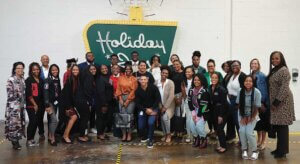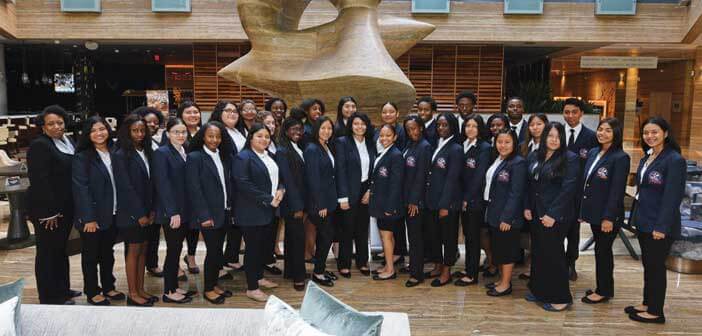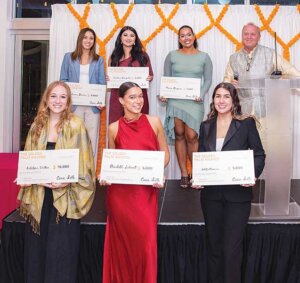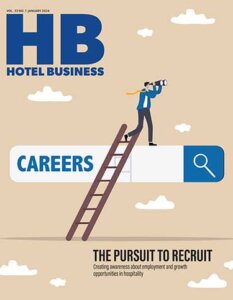There are some secrets that are just meant to be kept, like the original formula for Coca-Cola or where Jimmy Hoffa is buried. But there is one secret out there that many people are working to eliminate—that a career in the hotel industry is rewarding and offers room for growth.
“It is a fantastic career to be in hospitality, but we haven’t told the story well,” said Thom Geshay, CEO/president, Davidson Hospitality Group. [For more on his career, see sidebar on pg. 18.] “We tend to rest a little bit on the hard work ethic that we all put in, and we tell these stories about working 100-plus-hour weeks and everything else, but all that has done is a disservice really to our industry.”
He added, “When you ask people in our industry if they love the industry, they say yes. And if you ask people in other industries, ‘Hey, would you work in hospitality?’ They all say no. There’s this disconnect—people don’t really understand what the industry is.”
Unlike many other industries, hospitality is a career where someone starting from the bottom can rise through the ranks to the C-suite. For example, Geoff Ballotti, president/CEO, Wyndham Hotels & Resorts, began his career as a dishwasher (See sidebar for Ballotti’s journey).
“Hospitality is a uniquely inclusive industry where you can truly start from anywhere and build a successful career, regardless of degree, background or skill set,” said Rani Hammond, SVP, HR, Americas, IHG Hotels & Resorts. “Many senior leaders began in entry-level positions and worked their way into management through the vast opportunities, experiences and professional development afforded to them in hospitality.”
Heather Carnes, EVP, communications/chief strategy officer, AAHOA, pointed to David Kong, the former CEO of Best Western, who started off as a busboy, as an example of this. “He became one of the most beloved industry leaders for decades,” she said. “It gives me chills because there are only so many industries out there where that can actually happen. There is such a low barrier to entry. If you work hard, have the drive and personality for it, you can do anything.”
Anna Blue, president, AHLA Foundation, said she was skeptical when she first heard stories like Kong’s. “I started hearing these stories—a bellman who is now a GM or a front desk clerk who operates a region for a major hotel brand,” she said. “Every event I go to, I meet more of those people, and I realize it is actually the rule and not the exception.”
Another major draw for the hospitality industry is the flexibility it allows. Shirley Lau Chan, human resources director, Prince Resorts Hawaii, chose a career in hospitality just for that reason when her family moved from Hong Kong to Hawaii. “Hospitality has always been a huge thing in Hawaii and knowing that it is a large industry, I felt that if I majored in hospitality, there’s always an assurance that there would be a job,” she said. “And, if we ever decide to move, there are hotels everywhere in this world. There’s a flexibility from that aspect.”
For Mark Alvarez, chief people and culture officer, Raines, hospitality became his career because he needed a job after leaving the military. He learned quickly that it was easy for him. “All of a sudden, I found that I really liked taking care of people,” he said. “That, to me, was the basis of the industry—if you can take care of people, whether they work with you or they are a guest in your hotel, it is easy.”
What brings people into the industry—and keeps them here—is culture. “People are seeing it’s a fun place and that you can enjoy what you do,” he said. “You are putting smiles on peoples’ faces. It is not the end of the world when something goes wrong. You can fix it. When people see that there’s camaraderie, that there’s joy, that we spend a lot of time working together and we are doing well together, that is what hospitality is all about.”

IHG works with students at local hospitality schools to help them learn about the industry, including visits to the IHG Design Center.
Blue said that what makes a career in hospitality so attractive is that there are a seemingly endless number of jobs to be had. “There are very few careers that I can think of that you can’t do in this industry,” she added. “I don’t know of any other industry that is set up this way.”
To help combat some of the misconceptions about a career in hospitality and to attract new workers, the AHLA Foundation launched the “A Place to Stay” marketing campaign in January 2022.
The campaign centered on the testimonials of individuals employed at hotels, highlighting them on thehotelindustry.com the opportunities for upward mobility and lifelong careers. “It was just a place for people to explore different career paths through real stories,” Blue said. “It was a lot of storytelling of people’s journeys to see people who looked like them who started out in the same place in their lives and got to pursue all of these different career paths.”
Education programs
Obviously, if more students are aware of the benefits of a job in hospitality, they would choose it as a career.
As part of its efforts to help students find a career while they are in high school, NAF, a national education nonprofit designed to better prepare students for college, career and future success, has 80 academies for about 16,000 students in eight states focusing specifically on careers in hospitality and tourism.
The academies, which are part of select high schools, offer students an introduction to the industry and teach them the basics of the industry. “They learn the basics,” said Christine Rodriguez, director of instructional services, NAF. “They learn about ethics, hotel management and marketing. We also work on future-ready skills—collaboration, communication, self-awareness. The goal is that by the time they have left high school, they have worked on competencies from different levels.”
A key part of the learning process for the students is immersion in the industry, including internships, job shadowing and site visits. “They get to work with people in the industry, and that is what gets them really excited because it’s almost like they can see themselves in that place,” she said.
The program isn’t just about the basics. “Our curriculum instruction team is working to develop authentic learning projects around some of the unique roles that are available,” said Rodriguez. “We are looking at how we can encourage our students to take an issue or a need in the industry and innovate.”
Alumni of the program also come to speak with the students about their experiences. “A lot of our alums who are successful are less than a decade in,” she said. “Their trajectory and how they got there are just super fascinating.”
Another company, Discovery Education, is using its Career Connect product to educate students about career choices, including hospitality, and help companies connect with them.
“Discovery Education is a content creator,” said Amy Nakamoto, EVP, social impact, Discovery Education. “We work with corporate partners to create stories that students can find themselves in, from a diversity standpoint and a jobs and workforce pathway standpoint. Career Connect is truly designed to connect industry and classrooms in real time as a volunteer match platform.”
She is finding that companies are searching for ways to connect directly with the future workforce. “They want to have direct conversations with students in their formative years—dispelling misperceptions or showing people who have come through the ranks, whether it was an internship or a management training program.”
Companies who pay to be part of the program, which is free for schools, have employees on the platform, and those employees receive requests from teachers to talk about their career journey or other parts of their job.
Another aspect of the program that has been a benefit to companies that have taken part is that it strengthens the bond between the employee and the company. “We know that employees love to talk about their employer, and they feel a sense of pride when they are able to do that,” she said. “So when those employees are on a virtual connect, they can talk about why their companies are great and why they choose to get up early to go to work. We feel that connects that employee to that company in a much more unique way because now they are ambassadors for the company talking to the next generation.”
Industry outreach
In addition to the schools working with students, industry companies and associations are reaching out with their own programs to encourage careers in hospitality.
AHLA Foundation’s Blue said that her group has several programs targeting students for the industry, including working with hospitality schools by providing scholarships and educational seminars. The programs have also expanded to high schools. “The important thing is to go beyond just the training and to actually have all of the language that people need to understand our industry better,” she said.
The foundation is also targeting opportunity youth, 16- to 24-year-olds who are not currently in school or working. “We are funding multiple community-based organizations on the ground in target markets where the labor shortage is significant to let them know what these opportunities are, to provide them training, to provide them certifications so they can have a pipeline come into our industry.” she said.
For its own recruitment efforts, IHG created the IHG Academy, which since 2006 has taught more than 110,000 individuals about hospitality. “Our IHG Academy program engages diverse participants to ultimately increase social mobility and build hospitality skills for the future,” said Hammond. “[Participants] have gained valuable employment and life skills through online training, work experience, internships and apprenticeships.”
In 2022, the program expanded to include the IHG Skills Academy, a virtual learning platform accessed by nearly 25,000 users in more than 100 countries. “This year, we partnered with Cognisess to expand our offering to include cognitive assessments, allowing users to complete personality profiles and skills mapping assessments to identify their ideal roles,” she added.
As part of the Skills Academy initiative, IHG collaborates with hundreds of global organizations, including several not-for-profit social enterprises, including Jobs for America Graduates, Montana First Nation of Canada and GTTP (Global Travel and Tourism Partnerships).
The Atlanta-based company has also formed partnerships with the hospitality schools at the University of Georgia and Kennesaw State University, along with two Historically Black Colleges and Universities (HBCUs), Morehouse College and Clark Atlanta University. “We provide resources and engagement and extend opportunities for students at our partner schools to apply for our internship program,” she said.
With an aging workforce and an already limited supply of potential workers, Prince Resorts Hawaii (PRH) has created several programs to encourage students to pursue a career in hospitality by going into schools.
“We saw a big problem with the hospitality industry here in Hawaii because personnel are aging at all of our hotels, and younger people aren’t applying for jobs because they don’t understand the rewards of a career in hospitality,” said Rod Suzumoto, director of property operations, PRH. “So we decided to do something to create excitement for our industry among our students to keep talent here in Hawaii.”
One of its latest initiatives is “The Get Ready, Get Set, Go” program, which was developed by PRH senior managers to create an interest in a career in the hospitality industry among Hawaii’s students. The program was targeted to elementary through high school students but now is expanding to the college level for those students who are graduating without any practical job experience or clear path to a career.
The entire program originally only targeted high schoolers, but according to Lau Chan, it was already a little bit late because students had already chosen their career paths. “We took a step back and thought to give them a high-level idea of what the industry means would help from the intermediate section, so that when they are ready to transition from intermediate to high school, hospitality is something they would keep in mind,” she said.
They also realized that if they talked to younger kids, they could help instill some of those values that are not only necessary in hospitality, but also in life. “Elementary is when you build that basic standard,” Lau Chan said. “If it’s something you preach when they are young, it’s instilled in their blood, and they will just do it naturally.”
PRH is also targeting college students, especially student-athletes. “The athletes are the ones who have the least exposure to career days and internship opportunities because for the most part they are practicing,” said Lau Chan.
She said that the programs have been a win-win for the company and the community. “It is a win from the employer’s perspective because we do have an aging workforce—at our Oahu property, we have 470 employees and 70 employees have been with us since day one, so 34 years,” she said. “They are probably at the age where they are close to retirement or ready to retire.”
Raines’ Alvarez said the company has begun to record podcasts and videos to show how much fun a career in hospitality can be. “This is not just all work and boring,” he noted. “We discuss the avenues you can take in our industry.”
The NEWH (Network of Executive Women in Hospitality) is also working to promote hospitality as a career through educational programs, mentorship opportunities and networking events. “Our chapters reach out to schools to promote the hospitality industry and explain there’s a little bit more out there than I think people realize,” said Chris Tucker, president, NEWH.
The organization, which began 40 years ago to empower women in the hospitality industry, now has 6,300 members, both men and women, in five countries. It has awarded more than $8.6 million to more than 2,950 scholars pursuing careers in hospitality.
Tucker said that it is not just younger students who are taking advantage of the scholarship opportunities the organization offers. “A lot of our scholarship winners are mature students going back to school, pivoting in their careers, changing their focus and getting more involved in this business because there’s so much to offer,” she said.
Keeping them engaged
While getting someone interested in a career in hospitality is extremely important, once that person has entered the industry helping them along in their careers is just as important.
To help its unique audience of hotel owners, AAHOA has launched HYPE Ownership: Helping Young Professionals Evolve, an initiative dedicated to fostering the growth and success of emerging hoteliers within AAHOA and across the broader industry.
“We are unique because many of the young professionals that already know about AAHOA and already associate themselves with AAHOA are part of the second and third generation of hotel owners that make up the majority of hotel owners in the country.” said Carnes. “We had to think about how to support this unique group who have very different needs from their elders who got started in the industry several decades ago.”
But, she said, the initiative was launched to “attract new folks to the industry and let them know that there are resources and networks out there to support them in whatever they want to pursue.”
The initiative will provide educational opportunities and networking events, as well as an annual conference for young professionals and other hotel industry professionals.
To help its newest members find their way through the industry, NEWH has recently launched Martha’s Mentors, a 10-month initiative designed to connect aspiring professionals in the hospitality industry with experienced industry role models. “This program aims to empower mentees and support their journey towards achieving success and leadership positions within the hospitality sector,” said Tucker.
The program was the brainchild of Stacy Garcia, owner, Lebatex, and CEO/chief inspiration officer, Stacy Garcia Inc. “Martha was my dear friend, one of my first advisors when I started my career, and a generous and caring person who was a natural mentor to me,” said Garcia. “I was inspired to create the Martha’s Mentor Program with NEWH in Martha’s memory to create a legacy of handing down knowledge to the next generation of hospitality leaders. I believe that through a formal mentoring program, we can help facilitate lasting relationships that elevate both the mentors and mentees involved in the program.”



